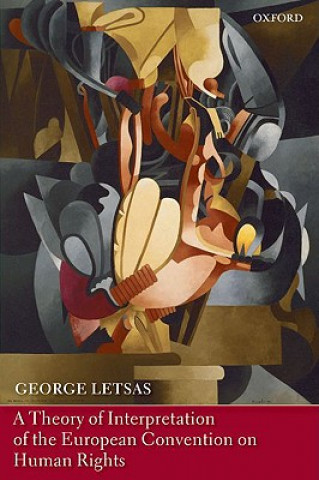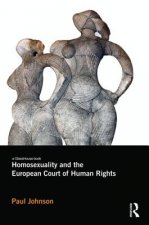
Kód: 01240563
Theory of Interpretation of the European Convention on Human Rights
Autor George Letsas
This book looks at both how the European Convention on Human Rights has been interpreted and how it ought to be interpreted. Unlike a purely doctrinal approach, it aims at proposing an evaluative theory of interpretation for the E ... celý popis
- Jazyk:
 Angličtina
Angličtina - Väzba: Brožovaná
- Počet strán: 176
Nakladateľ: Oxford University Press, 2009
- Viac informácií o knihe

Mohlo by sa vám tiež páčiť
-

Theory of Interpretation of the European Convention on Human Rights
191.85 € -

Sceptical Essays on Human Rights
80.33 € -

Legitimacy of International Human Rights Regimes
45.04 € -

Proportionality and the Rule of Law
46.25 € -

Theory and Practice of the European Convention on Human Rights, 5th edition (hardcover)
266.67 € -

Legislated Rights
141.27 € -

European Convention on Human Rights
90.39 € -5 % -

Jacobs, White, and Ovey: The European Convention on Human Rights
69.88 € -

Human Rights: A Very Short Introduction
9.95 € -22 % -

Cases, Materials, and Commentary on the European Convention on Human Rights
88.68 € -

General Principles of the European Convention on Human Rights
62.74 € -

Public Records Law for North Carolina Local Governments
104.27 € -

AWS Certified SysOps Administrator Associate All-in-One-Exam Guide (Exam SOA-C01)
69.57 € -

Housing Design Handbook
76.82 € -

STOLEN HEIR
13.36 € -8 % -

Antisocial
20 € -4 % -

Gruffalo Touch and Feel Book
8.24 € -28 % -

Meg and Greg: Frank and the Skunk
17.89 € -

Seasons of the Witch: Samhain Oracle
25.73 € -

Tractatus Logico-Philosophicus (Chiron Academic Press - The Original Authoritative Edition)
7.93 € -

Drawing on the Right Side of the Brain
20.91 € -8 % -

Whispers of Love Oracle
23.52 € -4 % -

Machine Learning for Algorithmic Trading
60.83 € -

Office One Quote A Day
10.55 € -

Writing for First (FCE)
51.68 € -

Cambridge English Proficiency 1 for Updated Exam Self-study Pack (Student's Book with Answers and Audio CDs (2))
47.25 € -

Homosexuality and the European Court of Human Rights
217.19 € -

Magna Carta
14.17 € -23 % -

Body Language - Learn How to Read Others and Communicate with Confidence
20.70 € -

Neo4j High Performance
38.80 € -

Desert Dawn
12.06 € -22 % -

Lord of the Rings Instrumental Solos for Strings
17.99 € -4 % -

Dear Leader
18.39 € -23 % -

Dead Man's Walk
13.56 € -13 % -

Legal Analyst - A Toolkit for Thinking about the Law
39.51 € -

Ecology of Law: Toward a Legal System in Tune with Nature and Community
31.56 € -13 % -

Theorie der juristischen Argumentation
25.93 € -4 % -

Reine Rechtslehre
31.67 € -

Světové výstavy EXPO
15.88 € -

Punk 57
14.27 € -

Ch?re Mamie au pays du confinement
9.44 € -

Kurshefte Geschichte - Allgemeine Ausgabe
28.15 €
Darujte túto knihu ešte dnes
- Objednajte knihu a vyberte Zaslať ako darček.
- Obratom obdržíte darovací poukaz na knihu, ktorý môžete ihneď odovzdať obdarovanému.
- Knihu zašleme na adresu obdarovaného, o nič sa nestaráte.
Viac informácií o knihe Theory of Interpretation of the European Convention on Human Rights
Nákupom získate 196 bodov
 Anotácia knihy
Anotácia knihy
This book looks at both how the European Convention on Human Rights has been interpreted and how it ought to be interpreted. Unlike a purely doctrinal approach, it aims at proposing an evaluative theory of interpretation for the European Convention on Human Rights. And unlike a purely normative account, it seeks to locate interpretive values within the history of the ECHR by surveying and analysing all the relevant judgements of the European Court of Human Rights. Consequently, the book discusses cases as much as it discusses philosophical theories, seeking to strike the appropriate balance between the two. Recent developments have raised mportant jurisprudential issues in relation to the interpretation of the ECHR which point to the relationship between the two foundational principles of a supranational human rights system: state sovereignty on one hand and the universality of human rights on the other. This book analyses the idea that creative interpretation and choice in interpretation amounts, by default, to illegitimate discretion and is used to wave the flag of judicial self-restraint.It balances this against the inconsistency or lack of clarity in the methods used by the Court, most notably the margin of appreciation doctrine, and looks at the criticism often levelled at the Court that its use of the doctrine masks the real basis for its decisions. The cases that have been coming before the European Court of Human Rights in recent years pose serious interpretive challenges. Does the right to life under art. 2 ECHR include the right to terminate one's life? Does the right to private life under article 8 ECHR include the right to sleep at night free from airplane noise? Does the right to property under art. 1 Protocol 1 ECHR entitle the former King of Greece to claim compensation for the expropriation of royal property, following a referendum? Do homosexual couples have a right to adopt under art. 8 ECHR? This book argues that how law should be interpreted, and what legal rights individuals have, are important questions of political morality that are both capable, and in need of, principled justification.Finally, the book argues that evolutive interpretation does not refer to how most European member states now understand their obligations under the Convention but to how they should understand them given the egalitarian values that they share, and defents the idea of an emerging consensus combined with a theory of autonomous concepts as a way to provide the appropriate authority for the Court to adopt an egalitarian theory of human rights.
 Parametre knihy
Parametre knihy
Zaradenie knihy Knihy po anglicky Law Laws of Specific jurisdictions Constitutional & administrative law
77.82 €
- Celý názov: Theory of Interpretation of the European Convention on Human Rights
- Autor: George Letsas
- Jazyk:
 Angličtina
Angličtina - Väzba: Brožovaná
- Počet strán: 176
- EAN: 9780199563883
- ISBN: 0199563888
- ID: 01240563
- Nakladateľ: Oxford University Press
- Hmotnosť: 274 g
- Rozmery: 236 × 166 × 11 mm
- Dátum vydania: 26. February 2009
Obľúbené z iného súdka
-

Equal Rights Handbook
12.56 € -

Matter of Interpretation
19.50 € -1 % -

Constitution of the United States of America with the Declaration of Independence
14.17 € -23 % -

Human Rights, Ownership, and the Individual
119.65 € -

America's Unwritten Constitution
26.34 € -5 % -

Age of Dignity
146.30 € -

Federalist Papers
9.84 € -5 % -

Federalist Papers
16.28 € -23 % -

Art of the Advocate
16.28 € -23 % -

Law of Public and Utilities Procurement Volume 2
374.26 € -

EU Constitutional Law
39.81 € -5 % -

Cyberwar
22.62 € -15 % -

Federalism: A Very Short Introduction
11.55 € -14 % -

Anti-Federalist Papers and the Constitutional Convention Debates
7.73 € -15 % -

European Convention on Human Rights
553.65 € -

Gabby Petito's Story
10.85 € -23 % -

Proportionality
77.92 € -

Framers' Coup
27.54 € -

Application of the Principle of Subsidiarity in Eu Law
61.23 € -

Power of Persuasion
41.22 € -

Privacy: A Very Short Introduction
9.95 € -22 % -

Commentaries on the Constitution of the United States Vol. III (in three volumes)
36.79 € -

Civil Liberties & Human Rights
60.22 € -

Staats- und Verwaltungsrecht Nordrhein-Westfalen
26.34 € -

Gunfight
19.90 € -

Rewriting Children's Rights Judgments
179.28 € -

Beginning Constitutional Law
50.27 € -

Raised Right
34.78 € -

Constitutional and Administrative Law
49.66 € -2 % -

Legitimate Expectations and Proportionality in Administrative Law
179.26 € -

Theory and Practice of the European Convention on Human Rights
266.67 € -

Corporate Counsel Survival Guide
80.74 € -

ISO 37001
21.51 € -

Data Privacy Law
236.20 € -

Fundamental Rights and Principles
166.31 € -

Anatomy of Human Rights in Israel
125.28 € -

Enterprise of Law
27.54 € -

Constitution of the United States of America and the Constitution of the Confederate States of America
11.96 € -

National and Regional Parliaments in the EU-Legislative Procedure Post-Lisbon
179.28 € -

Rule of Law in the European Union
146.40 € -

Federalist
17.08 € -

Legislation in Europe
224.53 € -

Constitutionalism and the Role of Parliaments
159.47 € -

Emerging Constitutional Law of the European Union
68.77 € -

European Convention on Human Rights
65.05 € -

Nature of Legislative Intent
133.33 € -

Law and Administration
126.59 € -

Turpin and Tomkins' British Government and the Constitution
77.92 € -

Cases, Materials and Text on National, Supranational and International Non-Discrimination Law
179.26 €
Osobný odber Bratislava a 2642 dalších
Copyright ©2008-24 najlacnejsie-knihy.sk Všetky práva vyhradenéSúkromieCookies



 21 miliónov titulov
21 miliónov titulov Vrátenie do mesiaca
Vrátenie do mesiaca 02/210 210 99 (8-15.30h)
02/210 210 99 (8-15.30h)